2023年中考英语复习 第三课时 七年级下册Units 1—6 课件(共60张PPT)
文档属性
| 名称 | 2023年中考英语复习 第三课时 七年级下册Units 1—6 课件(共60张PPT) |  | |
| 格式 | pptx | ||
| 文件大小 | 3.1MB | ||
| 资源类型 | 教案 | ||
| 版本资源 | 人教新目标(Go for it)版 | ||
| 科目 | 英语 | ||
| 更新时间 | 2023-06-10 22:02:30 | ||
图片预览


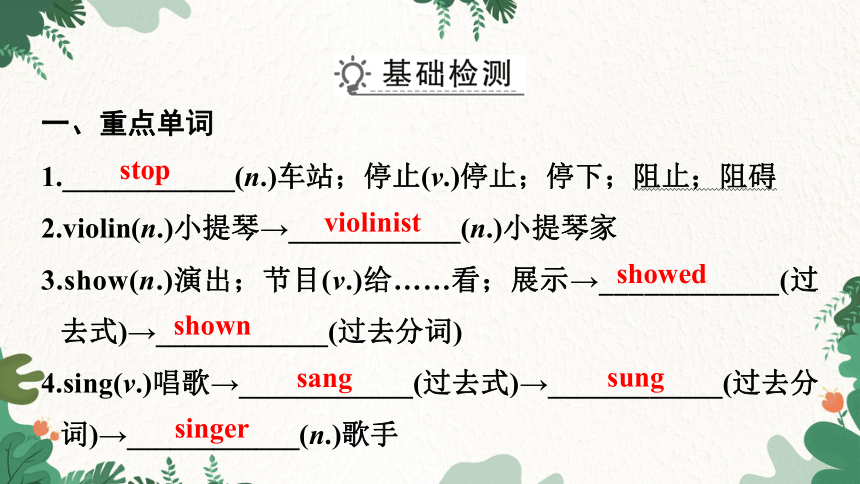
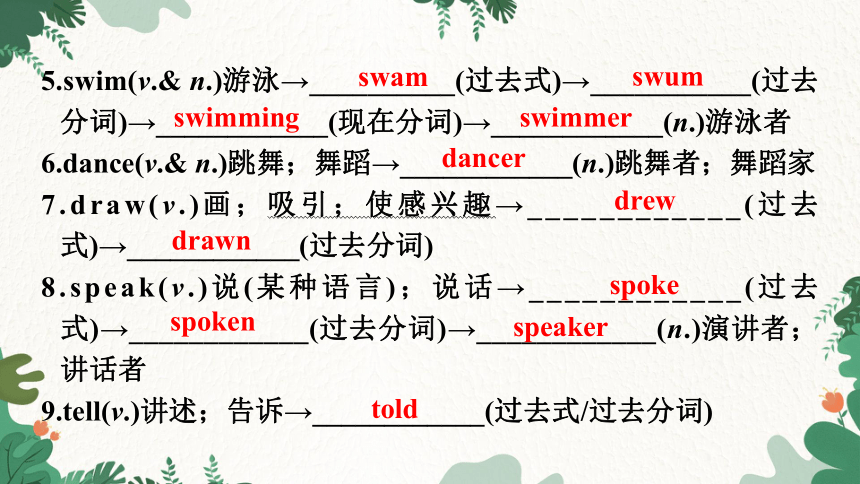
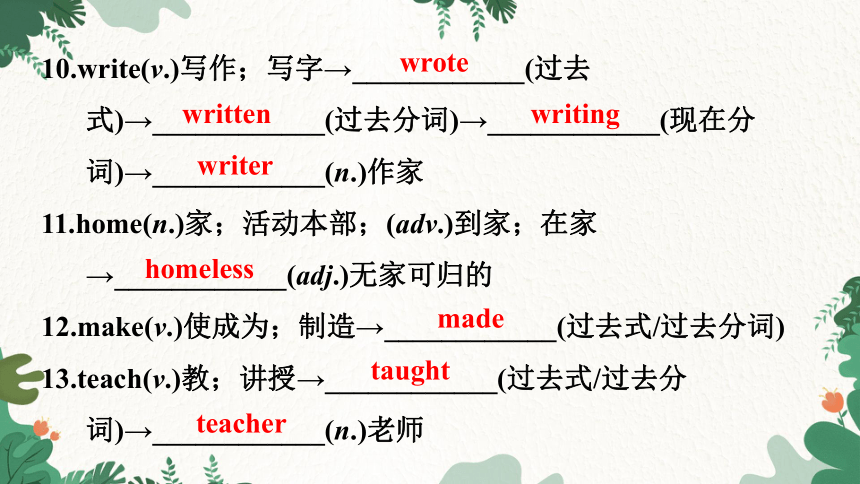
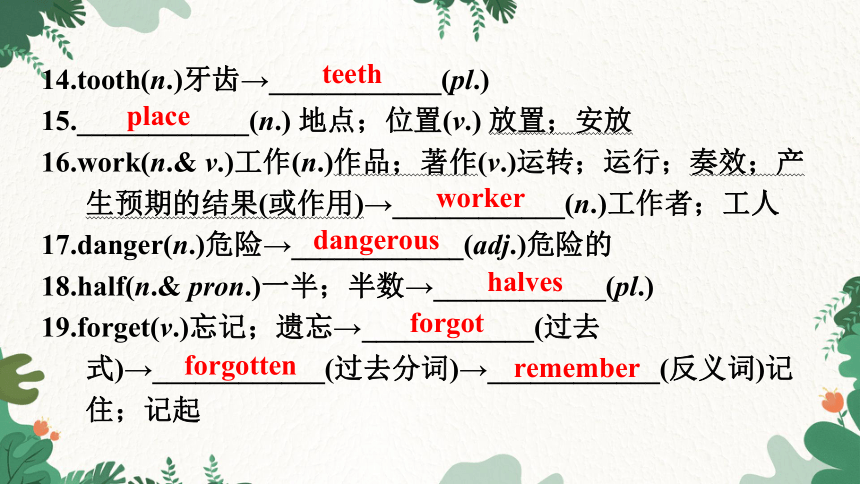
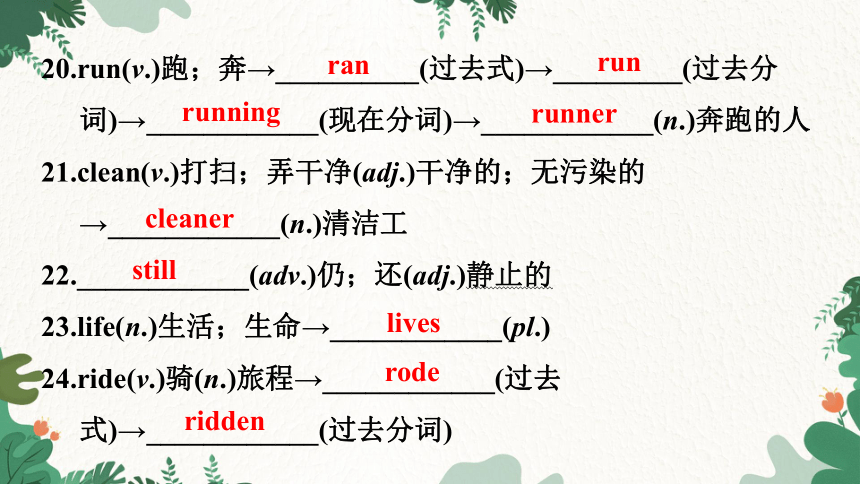
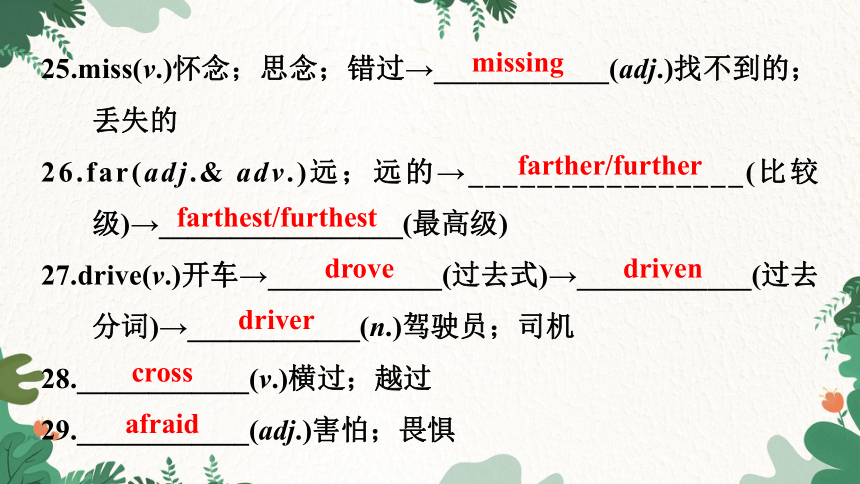
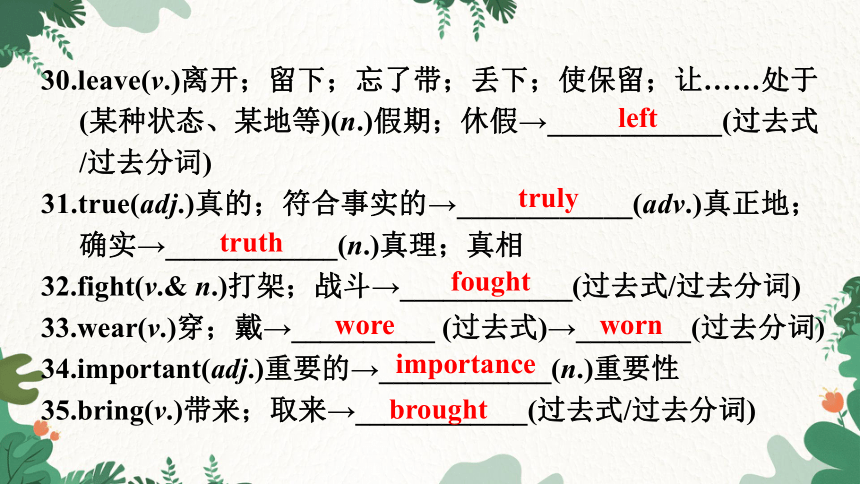
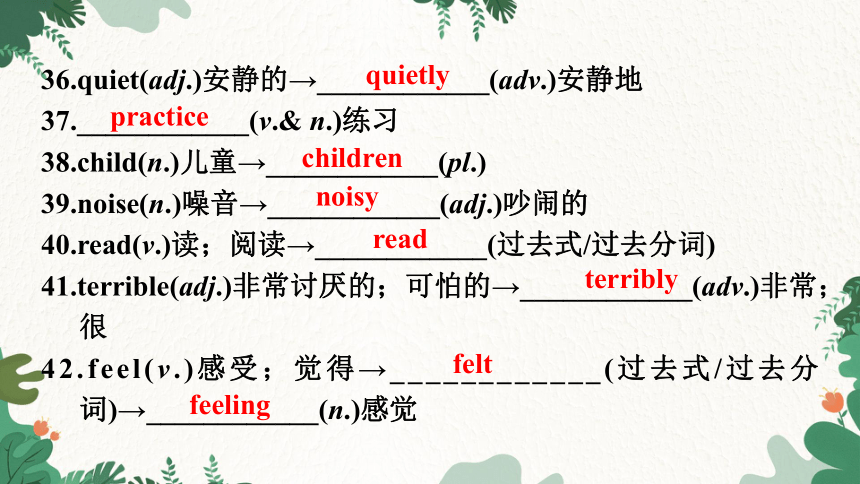
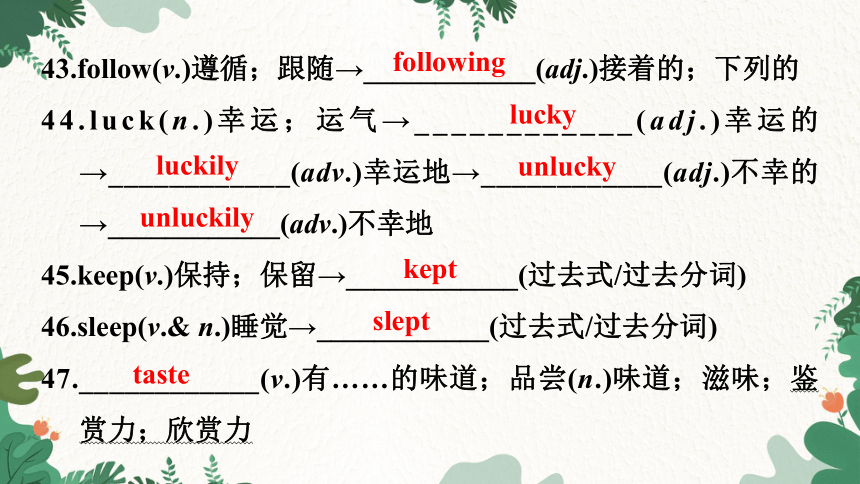
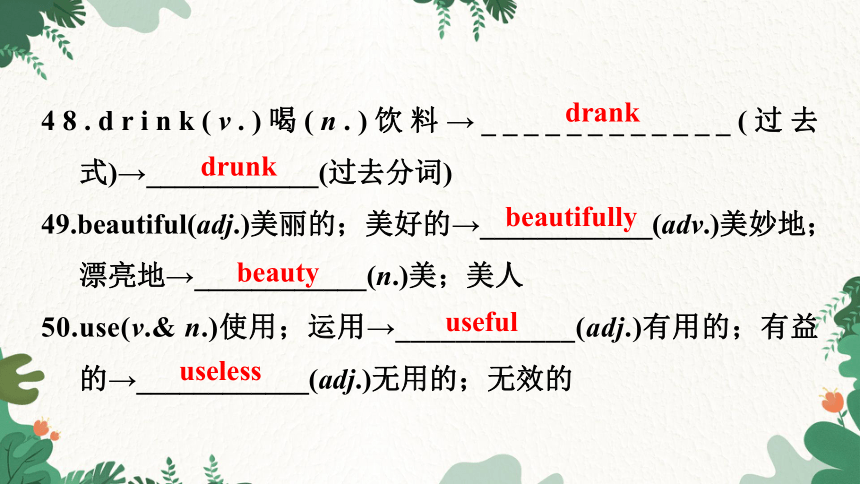
文档简介
(共60张PPT)
第三课时 七年级下册
Units 1—6
01
基础检测
02
考点精讲
03
考点精练
04
课时作业
一、重点单词
1.____________(n.)车站;停止(v.)停止;停下;阻止;阻碍
2.violin(n.)小提琴→____________(n.)小提琴家
3.show(n.)演出;节目(v.)给……看;展示→____________(过去式)→____________(过去分词)
4.sing(v.)唱歌→____________(过去式)→____________(过去分词)→____________(n.)歌手
stop
violinist
showed
shown
sang
sung
singer
5.swim(v.& n.)游泳→__________(过去式)→___________(过去分词)→____________(现在分词)→____________(n.)游泳者
6.dance(v.& n.)跳舞;舞蹈→____________(n.)跳舞者;舞蹈家
7.draw(v.)画;吸引;使感兴趣→____________(过去式)→____________(过去分词)
8.speak(v.)说(某种语言);说话→____________(过去式)→____________(过去分词)→____________(n.)演讲者;讲话者
9.tell(v.)讲述;告诉→____________(过去式/过去分词)
swam
swum
swimming
swimmer
dancer
drew
spoke
drawn
spoken
speaker
told
10.write(v.)写作;写字→____________(过去式)→____________(过去分词)→____________(现在分词)→____________(n.)作家
11.home(n.)家;活动本部;(adv.)到家;在家→____________(adj.)无家可归的
12.make(v.)使成为;制造→____________(过去式/过去分词)
13.teach(v.)教;讲授→____________(过去式/过去分词)→____________(n.)老师
wrote
written
writing
writer
homeless
made
taught
teacher
14.tooth(n.)牙齿→____________(pl.)
15.____________(n.) 地点;位置(v.) 放置;安放
16.work(n.& v.)工作(n.)作品;著作(v.)运转;运行;奏效;产生预期的结果(或作用)→____________(n.)工作者;工人
17.danger(n.)危险→____________(adj.)危险的
18.half(n.& pron.)一半;半数→____________(pl.)
19.forget(v.)忘记;遗忘→____________(过去式)→____________(过去分词)→____________(反义词)记住;记起
teeth
place
worker
dangerous
halves
forgot
forgotten
remember
20.run(v.)跑;奔→__________(过去式)→_________(过去分词)→____________(现在分词)→____________(n.)奔跑的人
21.clean(v.)打扫;弄干净(adj.)干净的;无污染的→____________(n.)清洁工
22.____________(adv.)仍;还(adj.)静止的
23.life(n.)生活;生命→____________(pl.)
24.ride(v.)骑(n.)旅程→____________(过去式)→____________(过去分词)
ran
run
running
runner
cleaner
still
lives
rode
ridden
25.miss(v.)怀念;思念;错过→____________(adj.)找不到的;丢失的
26.far(adj.& adv.)远;远的→________________(比较级)→_________________(最高级)
27.drive(v.)开车→____________(过去式)→____________(过去分词)→____________(n.)驾驶员;司机
28.____________(v.)横过;越过
29.____________(adj.)害怕;畏惧
missing
farther/further
farthest/furthest
drove
driven
driver
cross
afraid
30.leave(v.)离开;留下;忘了带;丢下;使保留;让……处于(某种状态、某地等)(n.)假期;休假→____________(过去式/过去分词)
31.true(adj.)真的;符合事实的→____________(adv.)真正地;确实→____________(n.)真理;真相
32.fight(v.& n.)打架;战斗→____________(过去式/过去分词)
33.wear(v.)穿;戴→__________ (过去式)→________(过去分词)
34.important(adj.)重要的→____________(n.)重要性
35.bring(v.)带来;取来→____________(过去式/过去分词)
left
truly
truth
fought
wore
worn
importance
brought
36.quiet(adj.)安静的→____________(adv.)安静地
37.____________(v.& n.)练习
38.child(n.)儿童→____________(pl.)
39.noise(n.)噪音→____________(adj.)吵闹的
40.read(v.)读;阅读→____________(过去式/过去分词)
41.terrible(adj.)非常讨厌的;可怕的→____________(adv.)非常;很
42.feel(v.)感受;觉得→____________(过去式/过去分词)→____________(n.)感觉
quietly
practice
children
noisy
read
terribly
felt
feeling
43.follow(v.)遵循;跟随→____________(adj.)接着的;下列的
44.luck(n.)幸运;运气→____________(adj.)幸运的→____________(adv.)幸运地→____________(adj.)不幸的→____________(adv.)不幸地
45.keep(v.)保持;保留→____________(过去式/过去分词)
46.sleep(v.& n.)睡觉→____________(过去式/过去分词)
47.____________(v.)有……的味道;品尝(n.)味道;滋味;鉴赏力;欣赏力
following
lucky
luckily
unlucky
unluckily
kept
slept
taste
48.drink(v.)喝(n.)饮料→____________(过去式)→____________(过去分词)
49.beautiful(adj.)美丽的;美好的→____________(adv.)美妙地;漂亮地→____________(n.)美;美人
50.use(v.& n.)使用;运用→____________(adj.)有用的;有益的→____________(adj.)无用的;无效的
drank
drunk
beautifully
beauty
useful
useless
二、重点词块
1.__________________下国际象棋
2.__________________擅长跳舞
3.__________________善于应付孩子
4.__________________跟我说
5.________________________和我交朋友
6.___________________________在英语方面帮助我
7.___________________________(在)周末
play chess
be good at dancing
be good at dancing
talk with/to me
make friends with me
help me with (my) English
on the weekend/on weekends
8.__________________起床;站起
9.__________________穿上衣服
10.__________________淋浴
11.__________________稍微;有点儿
12.__________________迷路
13._____________________处于(极大)危险之中
14.__________________砍倒
15.__________________由木头制成
get up
get dressed
take a shower
kind of
get lost
be in (great) danger
cut down
be made of wood
16.__________________出去吃饭
17.________________________在三月和五月之间
18.__________________实现;成为现实
19.__________________准时
20.__________________听音乐
21.__________________认为;想起
22.__________________清洗餐具
23.__________________铺他的床
24.__________________对我们要求严格
25.__________________遵守规则
eat out
between March and May
come true
on time
listen to music
think of
do the dishes
make his bed
be strict with us
follow the rules
三、重点句子
1.晚上我要么看电视,要么玩电脑游戏。 ____________________________________________________
2.——你到学校花费多长时间?
——骑自行车大约15分钟。
________________________________________________________________________________________________________
In the evening, I either watch TV or play computer games.
—How long does it take you to get to school
—About 15 minutes by bike.
3.从你家到学校有多远?____________________________________________________
How far is it from your home to school
辨析say, speak,tell与talk
say “说;讲”,侧重说话的内容。如:say it in English 用英语说
speak “说”,强调说的语言或者说话的能力和方式。如:speak English 说英语
tell “讲述;告诉”,侧重把一件事告诉别人。常用结构:tell sb.sth.告诉某人某事;tell sb.about sth.告诉某人关于某事;tell sb.(not) to do sth.告诉某人(不要)做某事
talk “谈话”,强调与某人交谈。常见搭配:talk to/with sb.与某人交谈;talk about sth.谈论某事
辨析also, either , too与as well
四者均表示“也”,其区别如下:
also 常用于肯定句,位于be动词、助动词或情态动词之后,实义动词之前 Jim likes blue.I also like blue.吉姆喜欢蓝色。我也喜欢。
either 通常位于否定句句末,其前加不加逗号均可 Jim doesn't like blue.I don't like blue either.吉姆不喜欢蓝色。我也不喜欢。
too 通常位于肯定句句末,其前加不加逗号均可
Jim likes blue.I like blue too/as well.吉姆喜欢蓝色。我也喜欢。
as well 通常位于肯定句句末,其前不加逗号 Jim likes blue.I like blue too/as well.吉姆喜欢蓝色。我也喜欢。
乘坐交通工具的常见表达方式
辨析arrive,get与reach
arrive vi. arrive at/in+小/大地点 arrive+地点副词 arrive in Paris 到达巴黎
arrive at the station
到达车站
arrive home 到家
get vi. get to+地点 get+地点副词 get to the post office
到达邮局
get there 到达那里
reach vt. reach+地点 reach the top of the mountain 到达山顶
keep的用法
辨析carry,bring,take与get
carry “搬;扛;提;拿”,不强调方向性,有负重之意 Jerry can't carry the box.
杰瑞搬不动这个箱子。
bring “拿来;带来”,把某物/人从别处带到说话处 Can we bring music players to school 我们可以把音乐播放器带来学校吗?(教材P20)
take “带走”,把某物/人从说话处带到别处 Please take these books to the classroom.
请把这些书带到教室。
get “拿来;取来”,强调往返 Could you get me a pen
你可以去给我拿支钢笔吗?
辨析too many,too much与much too
too many “太多”,用于修饰可数名词的复数 There are too many rules! 有太多的规章制度!
(教材P23)
too much “太多”,用于修饰不可数名词 Jessica is much too busy because she has too much homework to do.
杰西卡很忙,因为她有太多的作业要完成。
much too “太”,用来修饰形容词或副词 Jessica is much too busy because she has too much homework to do.杰西卡很忙,因为她有太多的作业要完成。
( )1.(2022柳州)—How are you going to Shanghai, Harry
—________ plane.
A.Of B.In C.By D.On
单项填空
C
( )2.—Look at the boy.He is too young to ________ all these books.
—Oh, let's go and help him.
A.read B.write C.create D.carry
D
( )3.________ your dictionary here when you come tomorrow.
A.Invent B.Keep C.Bring D.Spend
C
( )4.—Lily, you look different from before.
—Yes, I ate ________ meat and became ________ fat.
A.too much; much too B.too many; too much
C.too much; too many D.too many; much too
A
( )5.—I don't have ________ rules at home.What about you
—I don't ________.
A.much too; too B.too much; either
C.many too; too D.too many; either
D
( )6.When he arrived ________ the station, the train had left.
A.at B.to C.of D.in
A
7.(2022广西)Chinese is __________ by more and more people in the world.
8.(2022丹东改编)Be sure to __________ your mother the truth, no matter what happens.
9.(2022杭州改编)Lisa, don't __________ with your mouth full! It's bad manners.
10.(2022甘肃)It's rude not to __________ “Thank you” when you are given something.
选词填空
spoken
tell
talk
speak say tell talk
say
11.We must follow the rules.For example, we can't be late for school and we can't eat in class __________.
12.Lisa is good at drawing flowers.Her sister does well in it, __________.
13.My sister is good at all kinds of sports.She is a football fan.She __________ enjoys swimming.
either
too
either too also
also
14.I usually go there ________ car because it's my favorite way.
15.The school is not far from my home.It takes me 15 minutes to __________ a bike there every day.
16.I haven't decided how I will go on a trip, but I think it's more comfortable to __________ a train than to drive a car.
句子盲填(每空一词)
by
ride
take
17.(2022营口)昨天我到家时,我的爷爷正在浏览报纸。
________________________________________________________________________________________________________
18.(2022眉山)如果你在高中一直努力学习,你将会进入一所好大学。
You will get into a good university if ____________________________ in senior high school.
翻译/完成句子
When I got/arrived/reached home yesterday, my grandpa was looking through newspapers.
you keep studying hard
19.(2022广西)为了保持健康你最好放学后多花点时间做运动。
You'd better spend more time doing sports after school ____________________________.
(in order)to keep healthy/fit
一、完形填空
Chinese people are well known for being hospitable(好客的).Many even feel that they will lose face if their __1__ eat up all the food on the table.As we all know, food waste becomes a __2__ problem in China.Luckily, this situation can be __3__ with the help of a rule.
( )1.A.leaders B.winners C.guests D.officers
( )2.A.simple B.serious C.possible D.different
( )3.A.changed B.accepted C.created D.returned
C
1.句意:许多人甚至觉得,如果客人把桌上的食物都吃光了,他们就会丢面子。根据常识可知应是指客人吃光食物。故选C。
B
A
According to the rule, food providers who encourage or force people to __4__ too much food may face fines(罚款) of up to 10,000 yuan.And they should remind people to order the __5__ amount of food.
( )4.A.sell B.order C.cook D.taste
( )5.A.same B.total C.large D.proper
B
D
Besides, people are encouraged to finish all the food on the dining table.Now many people show their support for the rule by sharing photos and videos of empty __6__ online.And many Chinese people have __7__ the habit of taking leftovers(吃剩的食物) home.
( )6.A.chairs B.bowls C.buses D.rooms
B
6.句意:现在,许多人通过在网上分享空碗的照片和视频来表示他们对这项规定的支持。根据上文“Besides, people are encouraged to finish all the food on the dining table.”可知,人们被鼓励光盘行动,所以许多人通过晒空碗来表示他们对这项规定的支持。故选B。
Besides, people are encouraged to finish all the food on the dining table.Now many people show their support for the rule by sharing photos and videos of empty __6__ online.And many Chinese people have __7__ the habit of taking leftovers(吃剩的食物) home.
( )7.A.expected B.broken
C.discovered D.developed
D
7.句意:许多中国人已经养成了把剩菜带回家的习惯。 develop the habit养成习惯。故选D。
The purpose of introducing the rule is not to __8__ anybody, but to avoid food waste.Wasting food is not just a waste of money, but more __9__,a waste of resources(资源).It's necessary to create an environmentally friendly __10__.In a word, there is no excuse for wasting food.
( )8.A.punish B.allow C.invite D.understand
A
8.句意:引入该规则的目的不是惩罚任何人,而是避免浪费食物。 根据上文“food providers who encourage or…may face fines of up to 10,000 yuan.”可知,罚款的规定不是为了惩罚任何人,而是避免浪费食物。故选A。
The purpose of introducing the rule is not to __8__ anybody, but to avoid food waste.Wasting food is not just a waste of money, but more __9__,a waste of resources(资源).It's necessary to create an environmentally friendly __10__.In a word, there is no excuse for wasting food.
( )9.A.naturally B.similarly
C.importantly D.interestingly
( )10.A.society B.family C.school D.company
C
9.句意:浪费食物不仅仅是浪费金钱,更重要的是,它是浪费资源。根据下文“a waste of resources”可知,此处指相比金钱的浪费,更为重要的是资源的浪费。故选C。
A
【短文大意】本文介绍了一项反对食物浪费的新规定。
Most people agree that honesty is a good thing.But does Mother Nature agree Animals can't talk, but can they lie with their bodies and behavior Animal experts may not call it lying, but they do agree that many animals behave dishonestly to fool other animals.Dishonesty often helps them survive.
二、阅读理解B篇(2022成都改编)
Many kinds of birds are very successful in fooling other animals.A bird
called the plover sometimes pretends(假装) to be hurt in order to protect its young.When an enemy gets close to its nest, the plover pretends to have a broken wing.The enemy follows the “hurt” adult, leaving the baby birds safe.
Another kind of bird, the scrub jay, buries
(埋) its food so it always has something to eat.
Scrub jays also steal food.They watch where others bury their food and steal it.But clever scrub jays seem to know when others are watching them.So they get back later, unbury the food, and bury it again somewhere else.
Chimpanzees can also be sneaky.After a fight, the losing chimpanzee will give its hand to the other.When the winning chimpanzee puts out its hand, too, the chimpanzees are
friendly again.But an animal expert once saw a losing chimpanzee take the winner's hand and start fighting again.When chimpanzees find food, it's natural for them to cry out.Then other chimpanzees come running.But some clever chimpanzees learn to cry very softly when they find food.That way, other chimpanzees don't hear them, and they don't need to share the food.
( )1.Why does the plover pretend to be hurt
A.To show its friendliness. B.To save its young.
C.To catch the enemy. D.To save itself.
B
1.根据第二段“A bird called the plover sometimes pretends to be hurt in order to protect its young.”可知,plover 假装受伤是为了保护它的幼鸟。故选B。
( )2.What do clever scrub jays do with their food
A.They bury the food deep.
B.They watch the food.
C.They bury the food twice.
D.They eat the food at once.
C
2.根据第三段“So they get back later,unbury the food, and bury it again somewhere else.”可知,它们稍后会回来,把食物挖出来,再埋在别的地方。故选C。
( )3.What will the chimpanzee probably do after crying softly
A.It will eat all the food it finds.
B.It will share the food with others.
C.It will fight again with the winner.
D.It will bury its food and steal others' food.
A
3.根据第四段“That way, other chimpanzees don't hear them, and they don't need to share the food.”可知,黑猩猩轻轻地叫喊之后,其他黑猩猩听不到声音,它们就不需要分享食物。故选A。
( )4.According to Paragraph 4, in which picture can we find a sneaky animal
C
4.根据本段描述可知,这里说的是黑猩猩也可能是狡猾的,图片中C中的狐狸与之对应,故选C。
( )5.What is the best title of the passage
A.Do animals lie
B.Honesty or dishonesty
C.How do animals protect lives
D.Dose Mother Nature agree
A
5.根据第一段“Animals can't talk, but can they lie with their bodies and behavior?”“Dishonesty often helps them survive.”以及整个文章的理解可知,本文科普了一些动物为了生存而撒谎的现象并举例进行说明,A项“动物说谎吗”最适合做标题,故选A。
短文大意:本文科普了一些动物为了生存而撒谎的现象,并举了三个例子进行说明。
三、回答问题(2022贵港改编)
Do you know the self driving bullet(子弹) train just for the Beijing Winter Olympics Is there anything new on the train Let's have a look!
The train connects Beijing and Zhangjiakou, the co host cities of the Games.With a top speed of 350 kilometers an hour, the train can run the 174 kilometer journey between the two cities in around 50 minutes, while a regular express train takes three hours.
It can carry 564 passengers each trip in its eight cars.It has business, first class and second- class cars.Besides, for the needs of media, it also has special working cars with 12 tables and international electric sockets(电源插座).
The train is painted in white and blue colors and there are 24 snowflakes(雪花) on the outside of the train, showing this is the 24th Winter Olympic Games.Inside the train, there are winter sports photos on the walls and paper snowflakes on top.
The Beijing Winter Olympic Games opened in February, 2022.The high speed train provided transportation services for the 2022 Winter Olympics and the Paralympics(残奥会) from January 21 to March 16.Up to 40 pairs of trains traveled between the two cities every day.
1.Which two cities does the self driving bullet train connect
_____________________________________________________
2.Which train is faster, a self driving bullet train or a regular express train
_____________________________________________________
Beijing and Zhangjiakou.
A self driving bullet train.
3.How many kinds of cars does the train have according to the passage
_____________________________________________________
4.What do the 24 snowflakes stand for
_____________________________________________________
5.When was the Paralympics
_____________________________________________________
Four.
The 24th Winter Olympic Games.
From January 21 to March 16.
谢谢大家!
第三课时 七年级下册
Units 1—6
01
基础检测
02
考点精讲
03
考点精练
04
课时作业
一、重点单词
1.____________(n.)车站;停止(v.)停止;停下;阻止;阻碍
2.violin(n.)小提琴→____________(n.)小提琴家
3.show(n.)演出;节目(v.)给……看;展示→____________(过去式)→____________(过去分词)
4.sing(v.)唱歌→____________(过去式)→____________(过去分词)→____________(n.)歌手
stop
violinist
showed
shown
sang
sung
singer
5.swim(v.& n.)游泳→__________(过去式)→___________(过去分词)→____________(现在分词)→____________(n.)游泳者
6.dance(v.& n.)跳舞;舞蹈→____________(n.)跳舞者;舞蹈家
7.draw(v.)画;吸引;使感兴趣→____________(过去式)→____________(过去分词)
8.speak(v.)说(某种语言);说话→____________(过去式)→____________(过去分词)→____________(n.)演讲者;讲话者
9.tell(v.)讲述;告诉→____________(过去式/过去分词)
swam
swum
swimming
swimmer
dancer
drew
spoke
drawn
spoken
speaker
told
10.write(v.)写作;写字→____________(过去式)→____________(过去分词)→____________(现在分词)→____________(n.)作家
11.home(n.)家;活动本部;(adv.)到家;在家→____________(adj.)无家可归的
12.make(v.)使成为;制造→____________(过去式/过去分词)
13.teach(v.)教;讲授→____________(过去式/过去分词)→____________(n.)老师
wrote
written
writing
writer
homeless
made
taught
teacher
14.tooth(n.)牙齿→____________(pl.)
15.____________(n.) 地点;位置(v.) 放置;安放
16.work(n.& v.)工作(n.)作品;著作(v.)运转;运行;奏效;产生预期的结果(或作用)→____________(n.)工作者;工人
17.danger(n.)危险→____________(adj.)危险的
18.half(n.& pron.)一半;半数→____________(pl.)
19.forget(v.)忘记;遗忘→____________(过去式)→____________(过去分词)→____________(反义词)记住;记起
teeth
place
worker
dangerous
halves
forgot
forgotten
remember
20.run(v.)跑;奔→__________(过去式)→_________(过去分词)→____________(现在分词)→____________(n.)奔跑的人
21.clean(v.)打扫;弄干净(adj.)干净的;无污染的→____________(n.)清洁工
22.____________(adv.)仍;还(adj.)静止的
23.life(n.)生活;生命→____________(pl.)
24.ride(v.)骑(n.)旅程→____________(过去式)→____________(过去分词)
ran
run
running
runner
cleaner
still
lives
rode
ridden
25.miss(v.)怀念;思念;错过→____________(adj.)找不到的;丢失的
26.far(adj.& adv.)远;远的→________________(比较级)→_________________(最高级)
27.drive(v.)开车→____________(过去式)→____________(过去分词)→____________(n.)驾驶员;司机
28.____________(v.)横过;越过
29.____________(adj.)害怕;畏惧
missing
farther/further
farthest/furthest
drove
driven
driver
cross
afraid
30.leave(v.)离开;留下;忘了带;丢下;使保留;让……处于(某种状态、某地等)(n.)假期;休假→____________(过去式/过去分词)
31.true(adj.)真的;符合事实的→____________(adv.)真正地;确实→____________(n.)真理;真相
32.fight(v.& n.)打架;战斗→____________(过去式/过去分词)
33.wear(v.)穿;戴→__________ (过去式)→________(过去分词)
34.important(adj.)重要的→____________(n.)重要性
35.bring(v.)带来;取来→____________(过去式/过去分词)
left
truly
truth
fought
wore
worn
importance
brought
36.quiet(adj.)安静的→____________(adv.)安静地
37.____________(v.& n.)练习
38.child(n.)儿童→____________(pl.)
39.noise(n.)噪音→____________(adj.)吵闹的
40.read(v.)读;阅读→____________(过去式/过去分词)
41.terrible(adj.)非常讨厌的;可怕的→____________(adv.)非常;很
42.feel(v.)感受;觉得→____________(过去式/过去分词)→____________(n.)感觉
quietly
practice
children
noisy
read
terribly
felt
feeling
43.follow(v.)遵循;跟随→____________(adj.)接着的;下列的
44.luck(n.)幸运;运气→____________(adj.)幸运的→____________(adv.)幸运地→____________(adj.)不幸的→____________(adv.)不幸地
45.keep(v.)保持;保留→____________(过去式/过去分词)
46.sleep(v.& n.)睡觉→____________(过去式/过去分词)
47.____________(v.)有……的味道;品尝(n.)味道;滋味;鉴赏力;欣赏力
following
lucky
luckily
unlucky
unluckily
kept
slept
taste
48.drink(v.)喝(n.)饮料→____________(过去式)→____________(过去分词)
49.beautiful(adj.)美丽的;美好的→____________(adv.)美妙地;漂亮地→____________(n.)美;美人
50.use(v.& n.)使用;运用→____________(adj.)有用的;有益的→____________(adj.)无用的;无效的
drank
drunk
beautifully
beauty
useful
useless
二、重点词块
1.__________________下国际象棋
2.__________________擅长跳舞
3.__________________善于应付孩子
4.__________________跟我说
5.________________________和我交朋友
6.___________________________在英语方面帮助我
7.___________________________(在)周末
play chess
be good at dancing
be good at dancing
talk with/to me
make friends with me
help me with (my) English
on the weekend/on weekends
8.__________________起床;站起
9.__________________穿上衣服
10.__________________淋浴
11.__________________稍微;有点儿
12.__________________迷路
13._____________________处于(极大)危险之中
14.__________________砍倒
15.__________________由木头制成
get up
get dressed
take a shower
kind of
get lost
be in (great) danger
cut down
be made of wood
16.__________________出去吃饭
17.________________________在三月和五月之间
18.__________________实现;成为现实
19.__________________准时
20.__________________听音乐
21.__________________认为;想起
22.__________________清洗餐具
23.__________________铺他的床
24.__________________对我们要求严格
25.__________________遵守规则
eat out
between March and May
come true
on time
listen to music
think of
do the dishes
make his bed
be strict with us
follow the rules
三、重点句子
1.晚上我要么看电视,要么玩电脑游戏。 ____________________________________________________
2.——你到学校花费多长时间?
——骑自行车大约15分钟。
________________________________________________________________________________________________________
In the evening, I either watch TV or play computer games.
—How long does it take you to get to school
—About 15 minutes by bike.
3.从你家到学校有多远?____________________________________________________
How far is it from your home to school
辨析say, speak,tell与talk
say “说;讲”,侧重说话的内容。如:say it in English 用英语说
speak “说”,强调说的语言或者说话的能力和方式。如:speak English 说英语
tell “讲述;告诉”,侧重把一件事告诉别人。常用结构:tell sb.sth.告诉某人某事;tell sb.about sth.告诉某人关于某事;tell sb.(not) to do sth.告诉某人(不要)做某事
talk “谈话”,强调与某人交谈。常见搭配:talk to/with sb.与某人交谈;talk about sth.谈论某事
辨析also, either , too与as well
四者均表示“也”,其区别如下:
also 常用于肯定句,位于be动词、助动词或情态动词之后,实义动词之前 Jim likes blue.I also like blue.吉姆喜欢蓝色。我也喜欢。
either 通常位于否定句句末,其前加不加逗号均可 Jim doesn't like blue.I don't like blue either.吉姆不喜欢蓝色。我也不喜欢。
too 通常位于肯定句句末,其前加不加逗号均可
Jim likes blue.I like blue too/as well.吉姆喜欢蓝色。我也喜欢。
as well 通常位于肯定句句末,其前不加逗号 Jim likes blue.I like blue too/as well.吉姆喜欢蓝色。我也喜欢。
乘坐交通工具的常见表达方式
辨析arrive,get与reach
arrive vi. arrive at/in+小/大地点 arrive+地点副词 arrive in Paris 到达巴黎
arrive at the station
到达车站
arrive home 到家
get vi. get to+地点 get+地点副词 get to the post office
到达邮局
get there 到达那里
reach vt. reach+地点 reach the top of the mountain 到达山顶
keep的用法
辨析carry,bring,take与get
carry “搬;扛;提;拿”,不强调方向性,有负重之意 Jerry can't carry the box.
杰瑞搬不动这个箱子。
bring “拿来;带来”,把某物/人从别处带到说话处 Can we bring music players to school 我们可以把音乐播放器带来学校吗?(教材P20)
take “带走”,把某物/人从说话处带到别处 Please take these books to the classroom.
请把这些书带到教室。
get “拿来;取来”,强调往返 Could you get me a pen
你可以去给我拿支钢笔吗?
辨析too many,too much与much too
too many “太多”,用于修饰可数名词的复数 There are too many rules! 有太多的规章制度!
(教材P23)
too much “太多”,用于修饰不可数名词 Jessica is much too busy because she has too much homework to do.
杰西卡很忙,因为她有太多的作业要完成。
much too “太”,用来修饰形容词或副词 Jessica is much too busy because she has too much homework to do.杰西卡很忙,因为她有太多的作业要完成。
( )1.(2022柳州)—How are you going to Shanghai, Harry
—________ plane.
A.Of B.In C.By D.On
单项填空
C
( )2.—Look at the boy.He is too young to ________ all these books.
—Oh, let's go and help him.
A.read B.write C.create D.carry
D
( )3.________ your dictionary here when you come tomorrow.
A.Invent B.Keep C.Bring D.Spend
C
( )4.—Lily, you look different from before.
—Yes, I ate ________ meat and became ________ fat.
A.too much; much too B.too many; too much
C.too much; too many D.too many; much too
A
( )5.—I don't have ________ rules at home.What about you
—I don't ________.
A.much too; too B.too much; either
C.many too; too D.too many; either
D
( )6.When he arrived ________ the station, the train had left.
A.at B.to C.of D.in
A
7.(2022广西)Chinese is __________ by more and more people in the world.
8.(2022丹东改编)Be sure to __________ your mother the truth, no matter what happens.
9.(2022杭州改编)Lisa, don't __________ with your mouth full! It's bad manners.
10.(2022甘肃)It's rude not to __________ “Thank you” when you are given something.
选词填空
spoken
tell
talk
speak say tell talk
say
11.We must follow the rules.For example, we can't be late for school and we can't eat in class __________.
12.Lisa is good at drawing flowers.Her sister does well in it, __________.
13.My sister is good at all kinds of sports.She is a football fan.She __________ enjoys swimming.
either
too
either too also
also
14.I usually go there ________ car because it's my favorite way.
15.The school is not far from my home.It takes me 15 minutes to __________ a bike there every day.
16.I haven't decided how I will go on a trip, but I think it's more comfortable to __________ a train than to drive a car.
句子盲填(每空一词)
by
ride
take
17.(2022营口)昨天我到家时,我的爷爷正在浏览报纸。
________________________________________________________________________________________________________
18.(2022眉山)如果你在高中一直努力学习,你将会进入一所好大学。
You will get into a good university if ____________________________ in senior high school.
翻译/完成句子
When I got/arrived/reached home yesterday, my grandpa was looking through newspapers.
you keep studying hard
19.(2022广西)为了保持健康你最好放学后多花点时间做运动。
You'd better spend more time doing sports after school ____________________________.
(in order)to keep healthy/fit
一、完形填空
Chinese people are well known for being hospitable(好客的).Many even feel that they will lose face if their __1__ eat up all the food on the table.As we all know, food waste becomes a __2__ problem in China.Luckily, this situation can be __3__ with the help of a rule.
( )1.A.leaders B.winners C.guests D.officers
( )2.A.simple B.serious C.possible D.different
( )3.A.changed B.accepted C.created D.returned
C
1.句意:许多人甚至觉得,如果客人把桌上的食物都吃光了,他们就会丢面子。根据常识可知应是指客人吃光食物。故选C。
B
A
According to the rule, food providers who encourage or force people to __4__ too much food may face fines(罚款) of up to 10,000 yuan.And they should remind people to order the __5__ amount of food.
( )4.A.sell B.order C.cook D.taste
( )5.A.same B.total C.large D.proper
B
D
Besides, people are encouraged to finish all the food on the dining table.Now many people show their support for the rule by sharing photos and videos of empty __6__ online.And many Chinese people have __7__ the habit of taking leftovers(吃剩的食物) home.
( )6.A.chairs B.bowls C.buses D.rooms
B
6.句意:现在,许多人通过在网上分享空碗的照片和视频来表示他们对这项规定的支持。根据上文“Besides, people are encouraged to finish all the food on the dining table.”可知,人们被鼓励光盘行动,所以许多人通过晒空碗来表示他们对这项规定的支持。故选B。
Besides, people are encouraged to finish all the food on the dining table.Now many people show their support for the rule by sharing photos and videos of empty __6__ online.And many Chinese people have __7__ the habit of taking leftovers(吃剩的食物) home.
( )7.A.expected B.broken
C.discovered D.developed
D
7.句意:许多中国人已经养成了把剩菜带回家的习惯。 develop the habit养成习惯。故选D。
The purpose of introducing the rule is not to __8__ anybody, but to avoid food waste.Wasting food is not just a waste of money, but more __9__,a waste of resources(资源).It's necessary to create an environmentally friendly __10__.In a word, there is no excuse for wasting food.
( )8.A.punish B.allow C.invite D.understand
A
8.句意:引入该规则的目的不是惩罚任何人,而是避免浪费食物。 根据上文“food providers who encourage or…may face fines of up to 10,000 yuan.”可知,罚款的规定不是为了惩罚任何人,而是避免浪费食物。故选A。
The purpose of introducing the rule is not to __8__ anybody, but to avoid food waste.Wasting food is not just a waste of money, but more __9__,a waste of resources(资源).It's necessary to create an environmentally friendly __10__.In a word, there is no excuse for wasting food.
( )9.A.naturally B.similarly
C.importantly D.interestingly
( )10.A.society B.family C.school D.company
C
9.句意:浪费食物不仅仅是浪费金钱,更重要的是,它是浪费资源。根据下文“a waste of resources”可知,此处指相比金钱的浪费,更为重要的是资源的浪费。故选C。
A
【短文大意】本文介绍了一项反对食物浪费的新规定。
Most people agree that honesty is a good thing.But does Mother Nature agree Animals can't talk, but can they lie with their bodies and behavior Animal experts may not call it lying, but they do agree that many animals behave dishonestly to fool other animals.Dishonesty often helps them survive.
二、阅读理解B篇(2022成都改编)
Many kinds of birds are very successful in fooling other animals.A bird
called the plover sometimes pretends(假装) to be hurt in order to protect its young.When an enemy gets close to its nest, the plover pretends to have a broken wing.The enemy follows the “hurt” adult, leaving the baby birds safe.
Another kind of bird, the scrub jay, buries
(埋) its food so it always has something to eat.
Scrub jays also steal food.They watch where others bury their food and steal it.But clever scrub jays seem to know when others are watching them.So they get back later, unbury the food, and bury it again somewhere else.
Chimpanzees can also be sneaky.After a fight, the losing chimpanzee will give its hand to the other.When the winning chimpanzee puts out its hand, too, the chimpanzees are
friendly again.But an animal expert once saw a losing chimpanzee take the winner's hand and start fighting again.When chimpanzees find food, it's natural for them to cry out.Then other chimpanzees come running.But some clever chimpanzees learn to cry very softly when they find food.That way, other chimpanzees don't hear them, and they don't need to share the food.
( )1.Why does the plover pretend to be hurt
A.To show its friendliness. B.To save its young.
C.To catch the enemy. D.To save itself.
B
1.根据第二段“A bird called the plover sometimes pretends to be hurt in order to protect its young.”可知,plover 假装受伤是为了保护它的幼鸟。故选B。
( )2.What do clever scrub jays do with their food
A.They bury the food deep.
B.They watch the food.
C.They bury the food twice.
D.They eat the food at once.
C
2.根据第三段“So they get back later,unbury the food, and bury it again somewhere else.”可知,它们稍后会回来,把食物挖出来,再埋在别的地方。故选C。
( )3.What will the chimpanzee probably do after crying softly
A.It will eat all the food it finds.
B.It will share the food with others.
C.It will fight again with the winner.
D.It will bury its food and steal others' food.
A
3.根据第四段“That way, other chimpanzees don't hear them, and they don't need to share the food.”可知,黑猩猩轻轻地叫喊之后,其他黑猩猩听不到声音,它们就不需要分享食物。故选A。
( )4.According to Paragraph 4, in which picture can we find a sneaky animal
C
4.根据本段描述可知,这里说的是黑猩猩也可能是狡猾的,图片中C中的狐狸与之对应,故选C。
( )5.What is the best title of the passage
A.Do animals lie
B.Honesty or dishonesty
C.How do animals protect lives
D.Dose Mother Nature agree
A
5.根据第一段“Animals can't talk, but can they lie with their bodies and behavior?”“Dishonesty often helps them survive.”以及整个文章的理解可知,本文科普了一些动物为了生存而撒谎的现象并举例进行说明,A项“动物说谎吗”最适合做标题,故选A。
短文大意:本文科普了一些动物为了生存而撒谎的现象,并举了三个例子进行说明。
三、回答问题(2022贵港改编)
Do you know the self driving bullet(子弹) train just for the Beijing Winter Olympics Is there anything new on the train Let's have a look!
The train connects Beijing and Zhangjiakou, the co host cities of the Games.With a top speed of 350 kilometers an hour, the train can run the 174 kilometer journey between the two cities in around 50 minutes, while a regular express train takes three hours.
It can carry 564 passengers each trip in its eight cars.It has business, first class and second- class cars.Besides, for the needs of media, it also has special working cars with 12 tables and international electric sockets(电源插座).
The train is painted in white and blue colors and there are 24 snowflakes(雪花) on the outside of the train, showing this is the 24th Winter Olympic Games.Inside the train, there are winter sports photos on the walls and paper snowflakes on top.
The Beijing Winter Olympic Games opened in February, 2022.The high speed train provided transportation services for the 2022 Winter Olympics and the Paralympics(残奥会) from January 21 to March 16.Up to 40 pairs of trains traveled between the two cities every day.
1.Which two cities does the self driving bullet train connect
_____________________________________________________
2.Which train is faster, a self driving bullet train or a regular express train
_____________________________________________________
Beijing and Zhangjiakou.
A self driving bullet train.
3.How many kinds of cars does the train have according to the passage
_____________________________________________________
4.What do the 24 snowflakes stand for
_____________________________________________________
5.When was the Paralympics
_____________________________________________________
Four.
The 24th Winter Olympic Games.
From January 21 to March 16.
谢谢大家!
